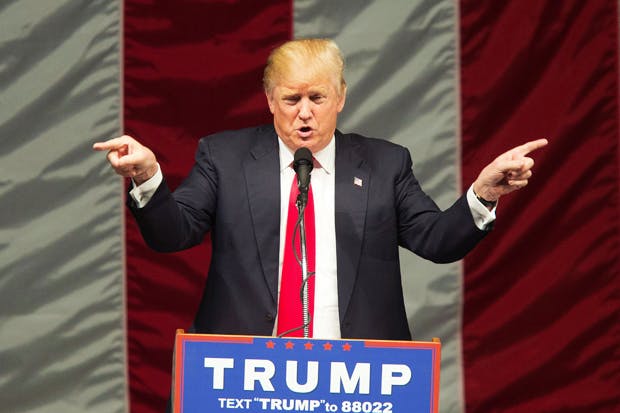Following Tuesday night’s Indiana primaries, the race for the Republican nomination is effectively over. Talk of Donald Trump being overhauled in a contested convention in July evaporated when Ted Cruz withdrew from the race after seven successive defeats. Compromise candidates have ruled themselves out, and Trump’s former opponents are reluctantly rallying around. It really has come to this: the people of the most powerful country on earth will be asked to choose between Hillary Clinton and her former campaign donor Donald Trump.
It cannot be assumed that Trump will be defeated in November. This week, for the first time, a poll put him ahead of her. The world is sooner or later going to have to face up to the possibility that a man whom our own Parliament recently debated banning from the UK, and whom the German magazine Der Spiegel recently called ‘the most dangerous man in the world’, might soon be leader of the world’s most powerful nation and commander-in-chief of the world’s largest military.
Is Donald Trump really such a danger to the world? Yes, but not in the way most of his critics usually assert. As the National Review has pointed out, Trump’s ascendancy means that Reagan-style conservatism is now in exile from the Republican party. He will attack Hillary Clinton from the left on every-thing from her Iraq vote to social security. But it is not his incoherent and contradictory foreign policy which we have to fear. It is his much more consistent — but seriously wrong — economic ideas that would inflict the most damage.
His victory speech in Indiana started attacking Mrs Clinton’s economics, saying that she ‘doesn’t understand trade’, apparently because Bill Clinton agreed to the North American Free Trade Agreement. The notion of international competition frightens him. To Trump, free trade is a system where ‘companies just think that they can move, go to another country, make their products, sell it back to us and we get only one thing: unemployment’. Jeremy Corbyn would have said the same thing, if he had the courage. Trump, like so many on the left, wants to build a wall around America not just to keep immigrants out but keep its companies in.
As he put it this week, ‘We’re not gonna let companies leave. Now if they want to go to a different state; good luck, compete. But when they start going to different countries, and in many cases countries that devalue their currency and make it impossible for our companies to compete, that’s not gonna happen. And if they wanna do it anyway there will be consequences and there will be very, very serious consequences.’ It’s worth quoting because this is the message that is resonating with a great many Americans. Trump is inviting them to feel afraid of the world and unconfident about America’s ability to compete.
Many in Britain could be forgiven for not taking Trump seriously — but this is, now, no longer an option. With far less money, no speech-writers, relatively few political staff, he has won an extraordinary victory, with far too much support to be written off as a wretched irrelevance. His protectionist message certainly has an appeal among those who believe the world economy is moving in a direction that disadvantages them. Trump has concentrated his ire on Chinese exporters, claiming they destroy US jobs. It is a message which gains great traction among poor white voters in the rustbelt, normally more inclined to vote Democrat. Inflammatory language on trade — such as accusing the Chinese of ‘raping’ the US — does not earn him condemnation on the left. On the contrary, it wins him the sort of voters who might have voted for Bernie Sanders.
In contrast to many of Trump’s policies, there is some logic to the claim that protectionism saves jobs. Tariffs of 45 per cent on Chinese-made goods would indeed protect some jobs in the short term. Unfortunately for America and the world, that would only come at the expense of a great deal of other jobs as general prosperity took a huge hit.
That is the experience of protectionism whenever it is tried. George W. Bush proved it in 2002 when, responding to complaints from US steelmakers, he slapped 30 per cent tariffs on foreign steel imports. An independent analysis the following year concluded that the move had cost some 200,000 jobs in steel-consuming industries, which had been hit by higher raw material costs as a result. Barack Obama proved it again seven years ago when he slapped tariffs on tyre imports for three years. The number of jobs in the US tyre industry grew by 1,200 to 52,000, but the estimated cost to American consumers was put at $1.1 billion. US motorists in effect paid $900,000 for every job created — and that is without taking into account the retaliatory tariffs which China imposed on chicken imports from the US.
But it is not enough to trot out such figures and blithely declare that the case for free trade is self-evident. It needs to be made again and again. The decaying Republican party has been unable to make this argument, so it was vulnerable to a fist-shaking challenger like Donald Trump. In Britain, the Conservatives have been very bad at defending conservatism, and are similarly vulnerable as a result. Trump’s ascendancy is a warning to conservatives the world over: failing to make the case for popular capitalism and basic economic freedom invites political disaster — as American conservatives are now finding out.
Got something to add? Join the discussion and comment below.
Get 10 issues for just $10
Subscribe to The Spectator Australia today for the next 10 magazine issues, plus full online access, for just $10.














Comments
Don't miss out
Join the conversation with other Spectator Australia readers. Subscribe to leave a comment.
SUBSCRIBEAlready a subscriber? Log in